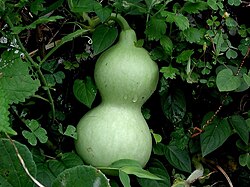Typical yield
18.0 t/ha
Varieties
1
Pest/Disease
3
Seasons
2
Profile
- Growth habit
- annual
- Lifecycle (days)
- 90–130
- Primary uses
- Fruit vegetable; utensils (dry shell)
- Pollination
- insect
- Origin / distribution
- Tropics; widely grown in East African lowlands and warm mid-altitudes
Environment
Climate
Temp optimal
22–30 °C
Rain optimal
600–900 mm/yr
Altitude
0–1600 m
Soil
pH optimal
6–7
Soil type
Fertile, well-drained loam
Farmer Guide
Row spacing
200 cm
Plant spacing
100 cm
Depth
2 cm
Seed rate
2 kg/ha
Nursery days
18
Planting: Plant into fertile, well-drained beds; provide strong trellis for vines; mulch to conserve moisture.
Transplanting: Transplant at 3–4 true leaves; avoid root disturbance; water in well.
Irrigation: Maintain steady moisture; increase during flowering/fruit set; avoid wet foliage at night.
Fertigation: If drip is available, split N and K weekly during fruiting.
Pest scouting: Scout for fruit fly and downy/powdery mildew; remove infested fruit; use traps and sanitation.
Pruning/Training: Train main vine on trellis; prune excess laterals for airflow and fruit quality.
Harvest: Harvest immature fruits 12–20 days after set for vegetables; leave longer for utensil shells.
Postharvest: Shade-cool; store at ~10–12 °C with high RH; handle gently to avoid scuffing.
Nutrient Schedule
| # | Stage | DAP | Product | Rate | Targets (kg/ha) | Notes |
|---|---|---|---|---|---|---|
| 1 | Basal | 0 | DAP 18-46-0 | 100 kg/ha | N: —, P₂O₅: —, K₂O: — | Band 5–8 cm from seedlings; avoid seed burn |
| 2 | Veg | 25 | CAN 26% N | 100 kg/ha | N: —, P₂O₅: —, K₂O: — | Irrigate after application |
| 3 | Micros | 28 | Trace mix (Zn, B) | 0 — | N: —, P₂O₅: —, K₂O: — | Foliar—follow label; apply early morning/evening |
Nutrient Requirements
| Nutrient | Stage | Amount | Unit |
|---|---|---|---|
| P₂O₅ | Basal | 40 | kg/ha |
| K₂O | Basal | 40 | kg/ha |
| N | Topdress | 40 | kg/ha |
| N | Veg | 40 | kg/ha |
Images

| Name | Country | Maturity | Traits |
|---|---|---|---|
| Calabash Local | KE | 110 | Long vines; uniform fruiting |
| Stage | Product | Rate (kg/ha) | Notes |
|---|---|---|---|
| Basal | DAP 18-46-0 | 100 | |
| Veg | CAN 26% N | 100 | Split if soils are light |
| Name | Type | Symptoms | Management |
|---|---|---|---|
| Fruit fly | pest | Oviposition stings; larval damage in fruit | Protein bait traps; field sanitation; timely harvest |
| Downy mildew | disease | Leaf blight under humid conditions | Improve airflow; avoid overhead irrigation; protective sprays when needed |
| Powdery mildew | disease | White powder on leaves | Sanitation; sulfur or labeled fungicides as needed |
| System | Typical | Min | Max | Notes |
|---|---|---|---|---|
| open-field | 18 | 10 | 30 |
| Country | Region | Planting | Harvest |
|---|---|---|---|
| KE | Lowlands | Mar–Apr | Jun–Aug |
| KE | Irrigated schemes | Year-round (staggered) | — |
| Country | Region | Suitability |
|---|---|---|
| KE | Lowlands | High |
| TZ | Coastal belt | High |
| UG | Lake Victoria basin (warm zones) | Medium |
